
Click Here to Read Part 1 Part 2 Part 3 Part 4 Part 5.1 Part 5.2
And that, my friends, is where it all started really going wrong.
I mean, yes, this twist ending was fairly contrived, and yes, the whole arc about the Primevals more or less inexplicable and owing to J. Robert King’s annoying penchant for inventing new and unnecessary epochs in
Dominaria’s prehistory, and yes, the prerevisionist planeswalkers were with little to no development and the lack of ceremony characteristic of a writer who didn’t care to do research about them, and yes, there were numerous moments that, even for fantasy, strain suspension of disbelief. But between the nobility of
Agnate and
Eladamri—not to mention the latter’s increasing sexual tension with
Sivvi—the first two sets of the block had enough to redeem their faults.
I mean, sure, the essential outline for
Invasion was “Banter! Explosion! Tragedy! Repeat!”, and for
Planeshift was “Banter! Explosion! Explosion! Betrayal! Repeat!”. There were some campy moments that seemed reminiscent of an Edgar Rice Burroughs adventure novel—amusing, but not actually quality. However, the formula for
Apocalypse was similar to the accursed one King would use two years later, writing
Onslaught block: “Banter! Explosion! Inexplicable! Banter! Banter! Inexplicable! Catastrophe!” Instead of the reader going, “Neat!” and “Oh no!”, the reader goes “Huh?” and “I guess?” and “What the deuce?”…
Aww, hell, you’ll see what I mean.
The Lord of the Wastes (though this title isn’t mentioned after Exodus, really) delights in the victory of his two greatest enemies changing sides (though I suspect they’d be about as useful to his cause as Italy was to the Axis). However, simply accepting their loyalty would not be the
Phyrexian way—they must earn
Yawgmoth’s good favor, through battle. Whoever can kill the other shall be his most trusted servant, and be granted any boon they wish.
Before you mention the obvious,
Yawgmoth also temporarily disables
Urza’s planeswalking and magical abilities, putting them on a relatively even footing. If
Urza wins, he wishes to be taught the glories of
Phyrexia, how to make machines truly live.
Gerrard’s desired boon, to the surprise of no one, is to have
Hanna returned to him, alive and free of
Yawgmoth’s will. For
Urza,
Gerrard has meant more than his own son ever did, and now he must destroy his greatest mistake. For
Gerrard,
Urza is more responsible for him than his actual father, and the author of all the tragedies in his life. Both men want blood.
Outside the Stronghold,
Eladamri has tried again and again to retake Portcullis, the massive main gate and symbol of
Phyrexian power, but it has been to no avail. Much like
Koilos, endless
Phyrexian legions flow out of the gate, making further advance impossible. However, the oddly increased seismic activity may have opened up a fortuitous back door.
The increased seismic activity turns out not to be so inexplicable—a cadre of
dwarven rock priests have journeyed, unhindered, to the Stronghold, to cleanse the mountain of the evil within. (My personal
fanon here is that these
dwarves are descendants of the
Sarpadian
dwarves who, according to legend, were to return to save all dwarfkind.)
Eladamri forges an alliance with the diminutive folk, and lets them get about their work.
Lord
Windgrace is the first of the Four Titans to return to the site of
Urza’s betrayal, though the others soon follow and find the panther man mourning his ancient friend. In a rite from his native
Urborg, he tears out
Taysir’s dead heart, and places it safely next to his own.
Freyalise had never liked
Urza, and has always loathed
Phyrexia. Their betrayal by one has no chance of stopping her from destroying the other. However, their suits are no longer safe, as
Urza can simply order them to kill their occupants, and since
Urza disabled the master bomb, all the charges must be set off manually.
They split into two teams, one ‘walker acting as defense while the other sets off the bomb.
Bo Levar and Commodore
Guff (who makes increasingly blatant allusions to the real-world editorial/publishing process) comprise one team…
While Lord
Windgrace and
Freyalise make up the other. The sylvan
planeswalker is more than delighted to blow increasingly larger holes in the largest realm of black mana in the multiverse.
Freyalise has no problem destroying, so long as the world she wants is created in the process. The ‘walkers set off the bombs, and “spontaneously” planeswalk away from the blasts (King uses this word each time to describe their quite intentional retreat… I do not think it means what he thinks it means).
On
Weatherlight itself,
Karn reveals to the crew many things that he has realized. His memories have all flowed back to him—his, and
Xantcha’s, things he has no right to know. Unlike all of
Urza’s other creations, the Legacy has shaped its own destiny, grown along parameters it decided itself.
Karn is part of the Legacy,
Weatherlight is part of it, and so is
Gerrard, and the rest of the crew. And now, all the parts are ready for their final evolution.
The ship transforms again, this time without
Karn and
Multani guiding it. In fact,
Multani has to explain himself to the ship’s manifesting consciousness, or risk being consumed in its transformation. The
maro and the
golem attend
Weatherlight as she is reborn, and once that is done,
Multani is free to return home. However, he knows that
Yavimaya cannot sit out the war, and so gives his life to transfer several square miles of the forest to
Urborg, complete with all its
kavu, elves, spiders, even raging gorillas.
Crovax is distressed to feel so much filthy green mana intruding in the pristine blackness and decay of
Urborg, and goes to investigate. The entire might of
Yavimaya descends upon him, and even with his many
Phyrexian enhancements, he cannot defeat the forces of
Gaea. At one point, he is literally
buried by saprolings. Still,
Crovax will not flee, and continues to fight.
While the master is away,
Ertai has fun playing his favorite new game—‘slaughter the
goblin cabin hand.’ It’s like whack-a-mole: no matter how many times you bash in the bugger’s head, he just keeps popping back up for more. However,
Squee’s flailing makes one of the wizard’s spells backfire, wounding him. Angrily,
Ertai retreats to the mana infuser.
Unfortunately for him (and really, what ever HAS gone his way?),
Squee regains consciousness, and mistakes the wounded
Ertai for a giant bug. He starts munching on
Ertai’s face, and finds this bug doesn’t taste so good. When it moves,
Squee jumps back, stumbles into a lever that causes an overload, and fries his former crewmate. After a rew minutes,
Squee even realizes who it was.
The battle between
Urza and
Gerrard lasts hours, possibly days. Fighting deep within
Yawgmoth’s psyche, anything is possible. Both have shed more blood than any ten men should hold. Both have died twice, though none of the victories was to
Yawgmoth’s satisfaction.
Gerrard time and again devises some clever new stratagem—such as mentally manipulating the
flowstone floor—only to see
Urza survive it, claim it as his own, and perfect it.
Urza scores the most kills, but
Yawgmoth is particularly displeased with them, as they are largely indirect, the results of traps and strategies.
Yawgmoth wants to see a tooth-and-nail, man-to-man, intensely personal slaying, and when it comes to that,
Gerrard has the advantage—he may be less than a hundredth
Urza’s age, but
Urza was never a warrior. After numerous reverses,
Gerrard uses one of
Yawgmoth’s soul-piercing blades to remove the head of
Urza planeswalker.
Yawgmoth is overjoyed, and showers boon after boon on the victor.
Gerrard is given superhuman strength, supreme intelligence, indomitable will… he accepts all these things patiently. But once
Yawgmoth is done, he demands the boon he was promised—
Hanna. She has sat in the stands, watching the battle unfold.
Yawgmoth is displeased, but holds to his word.
Hanna asks
Gerrard for
Urza’s head, and
Gerrard realizes that the
Hanna before him is not his
Hanna at all—merely another manifestation of
Yawgmoth. He attacks her, attacking
Yawgmoth himself by doing so, and is vomited up out of
Phyrexia for this betrayal, so quickly
Yawgmoth doesn’t even get a chance to rescind his gifts. Not like he’s a near-omnipotent demigod or anything.
Once
Weatherlight is again airborne, she starts searching for her missing crewmembers. Sensing at least
Squee within the Stronghold, she flies through the open caldera to save her tail gunner. Though the defenses have done massive damage to
Weatherlight in the past, her new mirrored hull makes her not just impervious to the attacks, but actually reflects them back at the
Phyrexian gunners.
Within the volcano itself, the
dwarves have breached the massive chamber housing the Stronghold, and summoned a torrent of magma into the
City of Traitors beneath it. The
il city is quickly enveloped, and lava fills the chamber at the rate of a cubic mile a minute. Nevertheless,
Eladamri,
Sivvi, and their army charges in through the
dwarven tunnel, though it’s not quite clear why they’re bothering.
Gerrard’s graceless return to
Crovax’s throne room summons the Evincar away from his battle—something guaranteed to put him into a foul mood. Neither hesitates from the inevitable clash, but as inevitable as
Ertai had thought
Crovax’s victory over
Volrath, so is
Gerrard’s defeat of
Crovax.
As the vampire dies, his
angel descends from above, and kneels beside him. As she rises again, so too does
Crovax’s soul—unstained by vampirism or the
Phyrexian enhancements.
Gerrard is glad to see there is some hope for salvation even for the darkest of souls, but he has other problems.
At least, he thinks he does, as
Phyrexian guards come to deal with the Evincar’s assassin. Even with
Squee’s help, he cannot overcome them all. However,
Urza’s severed head WAKES UP and kills all the guards with a magic blast. The
Weatherlight away team arrives with some help—freed prisoners—and all the characters have a banterful reunion.
Then,
Eladamri and his entire wing of the cast arrives, and everyone banters and laughs and has a good old time. Seriously. The tonal incongruity was strikingly hard to read.
Urza’s head is the first to come to his senses, and the party begins to ascend toward
http://wiki.mtgsalvation.com/article/Weath
erlight">Weath
erlight, which
Orim is doing her best not to crash (and is much more successful at it than
Gerrard ever was).
The remaining Titans have blown up all they could of
Phyrexia, but have little cause to celebrate. As
Guff observes, the destruction of
Phyrexia only gives
Yawgmoth no choice but to abandon it, and take
Dominaria. In fact,
Guff says it is destined to happen, he already approved it. And this is where my soul dies. According to Commodore
Guff, history is already written in his library, and
Dominaria loses. The other ‘walkers point out that if
Dominaria loses,
Guff’s library will be destroyed.
Guff says, “Oh, bother,” produces a cartoonishly large eraser, and does the planeswalking equivalent of scampering off.
I cannot even begin to describe what’s next, so here it is directly from the book:
Originally posted by
Apocalypse, page 250
Madly, he erased. Madly, yes, for what editor erases so fervently the words an author has written? What editor allows his author to write a hundred thousand words only to erase ten thousand of them? Only an editor desperate to get history right.
“Bother.”
Commodore
Guff crouched upon a gnarl of basalt and feverishly applied the massive eraser to the history of the
Dominarian Apocalypse. There went a sentence about the death of
Eladamri. Just after, Liin Sivi[sic] no longer died, for all the way through she had been paired to him as though she were his gimp leg. And what about this paragraph where
Bo Levar lights a cigar in a swamp and is blown to smithereens?
Guff didn’t even erase that bit, but crumpled up the whole page and threw it into the lava that seeped from a nearby crack. What else had to go to make this
goddamned trilogy work out? How about the legal material, and the dedication and acknowledgments? After all, who gives a goat’s droppings for the editor of an epic? Commodore
Guff hurled those pages aside and saw them catch fire. He threw out the teaser too. It had given away the destruction of
Dominaria anyway, something that was completely undecided at this point.
Commodore
Guff turned his face from the ravaged book in his hand and looked skyward. “This would never have happened when I was in charge of continuity.”
And crashing down the fourth wall went
By writer’s ill-advised whimsy, rent
And at least this lonesome reader sent
Into a five year long lament.
Well, at least
Guff didn’t erase the part where he dies, half a page later.
Worse off, this is the point where everything basically stops making sense at all. After the better part of a year since the early days of the Invasion,
Phyrexia still has not conquered
Yavimaya,
Llanowar, or the Ocean.
Yawgmoth has regained
Koilos, but lost most of
Urborg (like trading the Everglades for Death Valley—basically a wash). The millennia-long plan involving creating an artificial world and overlaying it atop
Dominaria net the bad guys NOTHING.
But
Yawgmoth has more tricks up his proverbial sleeves. See, up until Invasion, there was no hint that
Yawgmoth had the ability to resurrect the dead—
Phyrexia was a borglike realm of machines and mutant cyborgs, and while there were a few zombies thrown in, there was no
reason or
justification ever given for them. But oh well, Yawgy is too crazy to know what he can’t do, so not only is he a necromancer, he’s the LORD OF DEATH. And being such, he casts a spell reanimating all dead matter on
Dominaria to his service… including TOPSOIL.
Not only does every dead body on the entire realm—including all the heroes killed in the war—rise to
Yawgmoth’s call, but the
entire surface of the planet forms itself into basically mud golems, and attacks the natives of Dominaira. This begs the question: why didn’t
Yawgmoth do this in the first place? But worse still, is the fact that, strategically,
nothing changes.
Yawgmoth literally controls the ground, but gains no territory.
Weatherlight escapes out of the volcano as lava reaches the bottom of the Stronghold—and some scary black mist starts to flow from it. According to
Urza, the mist is none other than
Yawgmoth himself, entering onto
Dominaria to personally deliver the deathblow. Let me repeat the part of that that is stupid:
Yawgmoth is now a black mist Nobody really questions this, and they start thinking of ways to stop him, starting by dropping a plague engine atop the caldera, plugging the volcano like a djinn in a lamp.
They crash the plague ship right where they want it, but the plan fails. Around the world ravaged by a straight year of global war, the fighting reaches its most desperate. Lord
Windgrace retreats from the
Yawgmoth-cloud, taking the minotaurs to their homeland.
Bo Levar gives his life to defend some artistic merfolk, while
Freyalise defends the
Skyshroud.
Having been offloaded with the ground troops,
Sivvi and
Eladamri have since fled the hostile ground by scaling the boles of their magnigoth allies. But seeing
Yawgmoth appear above them, the shadowy mist killing all he grasps, and seeing the writhing doom of the undead below, they make a decision. In a final act of defiance, they leap into death, together, rather than let it take them.
Yawgmoth straddles half the world, but
Urza has a plan. Now that he has come personally into the field, he has exposed himself to danger. The early stages of the war were meant to rid the world of any white mana that could oppose him, and while green has managed to resist, it is not strong or concentrated enough to kill him. However,
Weatherlight’s core contains all the energy, all the white mana, that had made up
Serra’s Realm. Of course, that would destroy half the planet, but the
other half would live.
The crew thinks of another plan that doesn’t amount to yet-another
Sylex Blast.
Karn reveals that the
Null Moon is in fact a
Thran artifact, the Null Sphere, and has been collecting white mana since it rose into the heavens after the
Thran-
Phyrexia war. Even
Urza didn’t know this. Ratcheting up the shift envelope that protects the ship between worlds,
Sisay sets a course.
Into space. At this point, why not?
Weatherlight accedes to this plan willingly, knowing that channeling all the mana from the
Null Moon will kill her. She asks
Karn to take her personality into him, as he contained that of
Xantcha, and the
Thran artificer
Glacian, as he was the embodiment of the Legacy itself. He agrees, sadly, and the plan is carried out.
Weatherlight floods
Urborg with white mana, and
Yawgmoth starts to burn away.
Yawgmoth tries to retreat back into the shattered spheres of
Phyrexia, but his point of access, the Stronghold, does not exist anymore—the
dwarves, too small and powerless for him to bother noticing, have destroyed it. Trapped, he lashes out at
Weatherlight, thinking of her both as
Gaea and of
Rebbec the woman who scorned him so many centuries ago. Although he’s obviously mad, he’s still quite powerful, and manages to attack
Weatherlight and disengage it from the flow of mana from the
Null Moon.
The plan has failed.
Weatherlight is dead, and cannot glide forever no matter how hard
Karn tries to keep it aloft. The world is covered in darkness and death, and even
Urza’s original drastic plan won’t work now. There is only one option left: that of Deus ex Machina. Within
Karn and
Weatherlight, all the mechanical components of the Legacy are united, but there are a few parts yet remaining.
Urza’s eyes, the
Mightstone and
Weakstone that hold
Glacian’s soul and caused the
Brothers’ War, and
Gerrard himself.
Urza is out of reason, but he
believes that the final synthesis of these elements will bring the Legacy into its final culmination.
Gerrard reaches into
Urza’s head, and gouges out his powerstone eyes. After a gory moment, the
planeswalker is, truly, dead. With a final sigh,
Gerrard reaches into
Karn’s hollow chest, and forces the two stones together. The white mana in
Weatherlights engine bursts forth, but not in a simple explosion—this blast has a will of its own. In a few shining minutes, the Legacy of
Glacian and
Urza and
Gerrard scours the world clean of
Yawgmoth and all his minions. Every
Phyrexian on the planet is destroyed, and the war is over.
W. T. F. ?
One year later, the surviving dignitaries of
Dominaria meet at
Urborg, for the dedication of a monument to all those killed in the war. (As to how any sort of nobility survived devastation that total, much less rebuilt to the extent needed to organize a meeting and build a huge monument while rebuilding their own homelands, and all in the course of a year… who am I to judge?) Nobles from across the globe show their respect to the fallen, and to those who yet live—
Sisay,
Tahngarth,
Orim, and
Squee highest among them. After a brief oration by
Freyalise—she and
Windgrace were the only Titans to survive—the ceremony adjourns, and the remaining
Weatherlight crew is greeted by one other survivor—
Karn. Somehow, when the Legacy was brought together, not only was
Yawgmoth destroyed, but something else impossible happened: a
golem became a
planeswalker (though there were hints to that happening throughout the trilogy). And with
Glacian,
Urza,
Gerrard,
Xantcha,
Weatherlight, and probably Saint Catherine all living in his head, he’s already well on his way to crazy. After the brief reunion,
Karn again departs, taking
Orim along to drop off with
Cho-Manno on
Mercadia. Now with only
Tahngarth and
Squee to keep her company,
Sisay returns to her new ship—a merchant galley called
Victory.
How could it have come to this? All the ominous potential of the
Rath Cycle, all the build up of
Urza’s Block, all of it culminating in
this? Many of the ideas here (though not
Guff) could even have been salvageable, only, it seemed as if nobody on WotC’s side cared anymore. Where at the beginning, the storyline was the headline for each new set, now it was treated as an obligation grudgingly continued and put out of the way as quickly as possible. “Stuff happens to some characters. Now on to the cards!” Possibly the only thing worse than abandoning the story midstream (as many of the prerevisionist storylines had been) is to force someone with waning interest to continue.
But perhaps this is unfair. Scott McGough continued as head of continuity for a while afterward I believe, and has since written some of the most popular
Magic books, particularly
Chainer’s Torment. After the debacle
The Weatherlight Saga became, WotC moved on to a different mode of storytelling for sets. Two blocks—Odyssey and Onslaught—took place on a remote corner of post-apocalyptic
Dominaria, during which the storyline presence on the cards was toned down considerably, but most major plot events were represented, and major characters showed up on multiple cards and flavor texts. Starting with Mirrodin, even that diminished storyline presence was washed away—someone looking at only the cards in a modern set would be hard pressed to notice that there is any storyline going on there at all.
Instead, cards themselves are obligated only to evoke the setting, with storyline buffs only getting a bone when it comes to the cards for characters themselves—and even then there have tended to be a plethora of extraneous legends wandering about. Though WotC wished it and tried its hardest to make it so,
Magic simply cannot support a parallel novel line the way that
Dungeons and dragons can. I blame all of you for not reading enough. Slackers.
The game itself, which had been in such dire peril before Invasion, ironically exited the block stronger than ever. The player base of the game exploded during the block, as new players fled the sinking ship of Pokemon and old players flocked back to the game. Before Ravnica block, Invasion was inarguably the most beloved block in the history of the game. Magic had weathered its storm and stayed afloat—what matter if the storyline had been washed away in the meantime?
As for
Dominaria, more horrors were yet to come. After what should have been his final defeat, after performing unspeakable acts for which many thought and hoped he would be banished from
Dominaria forever, the destroyer returned. J. Robert King got to write more books. And not just
a new book, to show he could play nice. No, he was given the responsibility for writing the second trilogy about the wars on Otaria, concluding that entire plot arc—because he had shown himself to be so good at ending storylines.
Proph… *gag*, PROPHECY could be ignored easily enough, as it did not impact the plot in any way. Onslaught block had repercussions across the entire plane, possibly the entire multiverse, and by all accounts, Legions and Scourge took the inexplicable insanity of Apocalypse to an entirely new level. Imagine what it would have been like if The Phantom Menace had turned out to be the BEST of the prequals, and you’ll know about how storyline aficionados felt. Apocalypse was grossly disappointing, but Scourge was a true debacle. Though no formal comment was ever made on the subject, to my knowledge, King has not written for Magic since.
And now, three years after
Scourge, five years after
Apocalypse Magic is finally ending its sojourn into the multiverse. We are going home. It may not be the greatest of planes anymore, but we know what glories it has seen in the past. The cumulative effect of disaster after disaster has taken its toll, but
Dominaria has always recovered from it before. Thought it may need a helping hand,
Dominaria shall rise again. And, like as not, be virtually destroyed again, and every time that happens, I’ll think of
Weatherlight, and give a little smile.

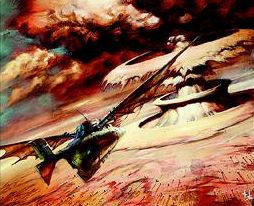
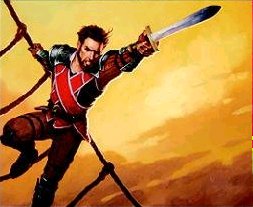
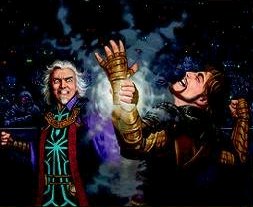
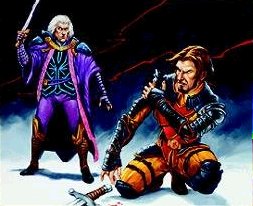
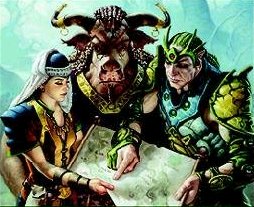
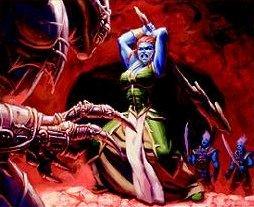
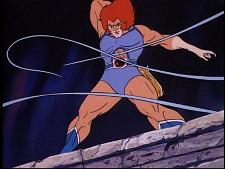
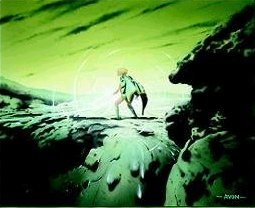
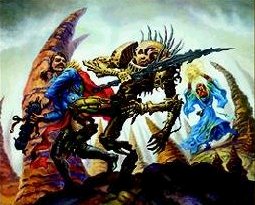
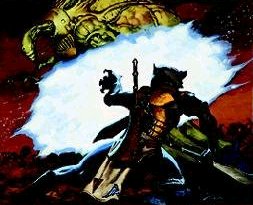
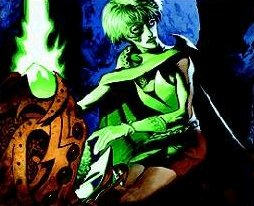
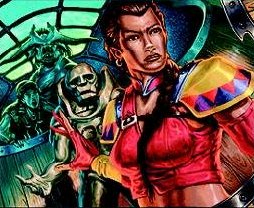
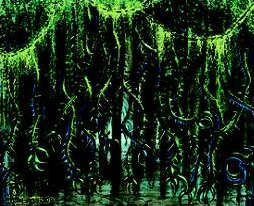
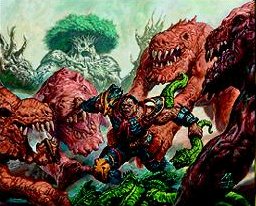
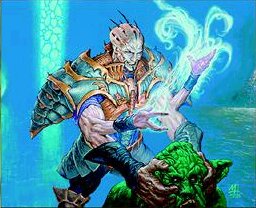
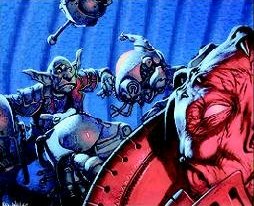
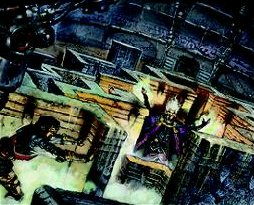
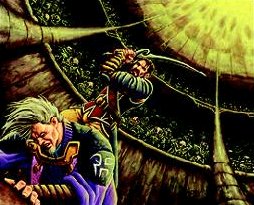

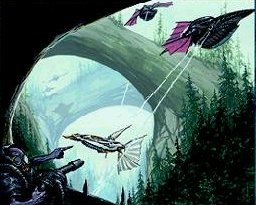
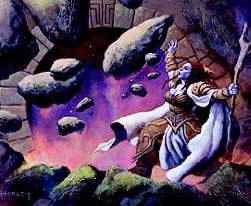
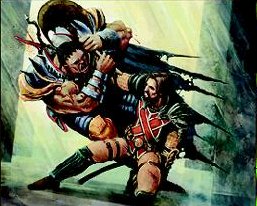
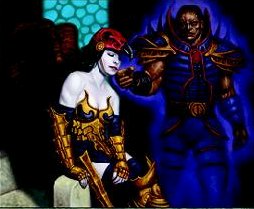
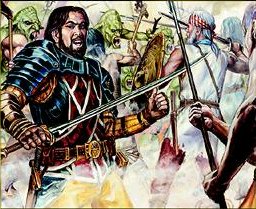
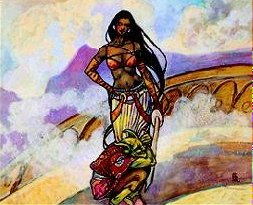
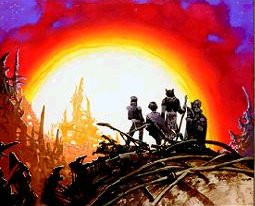
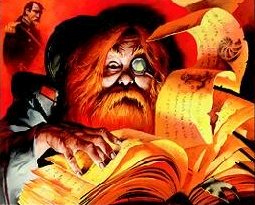
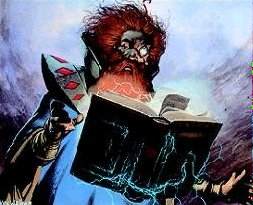
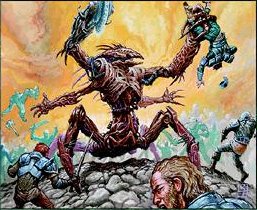
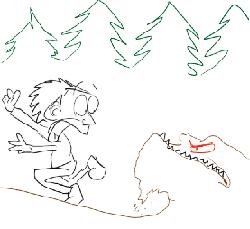

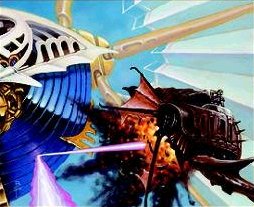


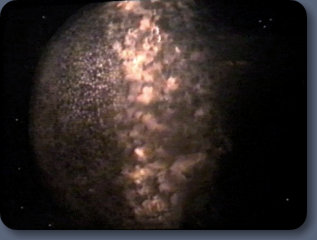
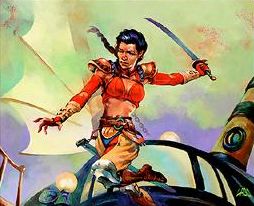
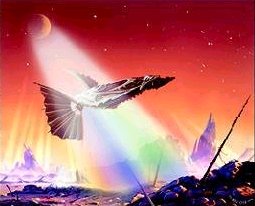
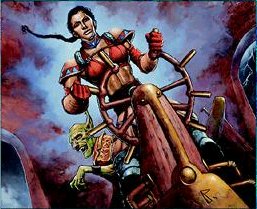
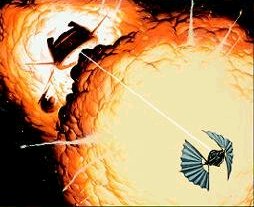
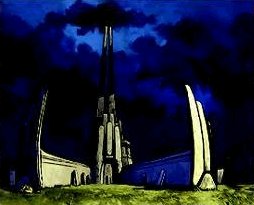
-
View User Profile
-
Send Message
Posted Feb 26, 2015And that, my friends, is where it all started really going wrong.
I mean, yes, this twist ending was fairly contrived, and yes, the whole arc about the Primevals more or less inexplicable and owing to J. Robert King’s annoying penchant for inventing new and unnecessary epochs in Dominaria’s prehistory, and yes, the prerevisionist planeswalkers were with little to no development and the lack of ceremony characteristic of a writer who didn’t care to do research about them, and yes, there were numerous moments that, even for fantasy, strain suspension of disbelief. But between the nobility of Agnate and Eladamri —not to mention the latter’s increasing sexual tension with Sivvi —the first two sets of the block had enough to redeem their faults.
I mean, sure, the essential outline for Invasion was “Banter! Explosion! Tragedy! Repeat!”, and for Planeshift was “Banter! Explosion! Explosion! Betrayal! Repeat!”. There were some campy moments that seemed reminiscent of an Edgar Rice Burroughs adventure novel—amusing, but not actually quality. However, the formula for Apocalypse was similar to the accursed one King would use two years later, writing Onslaught block: “Banter! Explosion! Inexplicable! Banter! Banter! Inexplicable! Catastrophe!” Instead of the reader going, “Neat!” and “Oh no!”, the reader goes “Huh?” and “I guess?” and “What the deuce?”…
Aww, hell, you’ll see what I mean.
The Lord of the Wastes (though this title isn’t mentioned after Exodus, really) delights in the victory of his two greatest enemies changing sides (though I suspect they’d be about as useful to his cause as Italy was to the Axis). However, simply accepting their loyalty would not be the Phyrexian way—they must earn Yawgmoth’s good favor, through battle. Whoever can kill the other shall be his most trusted servant, and be granted any boon they wish.
Before you mention the obvious, Yawgmoth also temporarily disables Urza’s planeswalking and magical abilities, putting them on a relatively even footing. If Urza wins, he wishes to be taught the glories of Phyrexia, how to make machines truly live. Gerrard ’s desired boon, to the surprise of no one, is to have Hanna returned to him, alive and free of Yawgmoth’s will. For Urza , Gerrard has meant more than his own son ever did, and now he must destroy his greatest mistake. For Gerrard , Urza is more responsible for him than his actual father, and the author of all the tragedies in his life. Both men want blood.
Outside the Stronghold, Eladamri has tried again and again to retake Portcullis, the massive main gate and symbol of Phyrexian power, but it has been to no avail. Much like Koilos, endless Phyrexian legions flow out of the gate, making further advance impossible. However, the oddly increased seismic activity may have opened up a fortuitous back door.
The increased seismic activity turns out not to be so inexplicable—a cadre of dwarven rock priests have journeyed, unhindered, to the Stronghold, to cleanse the mountain of the evil within. (My personal fanon here is that these dwarves are descendants of the Sarpadian dwarves who, according to legend, were to return to save all dwarfkind.) Eladamri forges an alliance with the diminutive folk, and lets them get about their work.
Lord Windgrace is the first of the Four Titans to return to the site of Urza ’s betrayal, though the others soon follow and find the panther man mourning his ancient friend. In a rite from his native Urborg , he tears out Taysir ’s dead heart, and places it safely next to his own.
Freyalise had never liked Urza, and has always loathed Phyrexia. Their betrayal by one has no chance of stopping her from destroying the other. However, their suits are no longer safe, as Urza can simply order them to kill their occupants, and since Urza disabled the master bomb, all the charges must be set off manually.
They split into two teams, one ‘walker acting as defense while the other sets off the bomb. Bo Levar and Commodore Guff (who makes increasingly blatant allusions to the real-world editorial/publishing process) comprise one team…
While Lord Windgrace and Freyalise make up the other. The sylvan planeswalker is more than delighted to blow increasingly larger holes in the largest realm of black mana in the multiverse. Freyalise has no problem destroying, so long as the world she wants is created in the process. The ‘walkers set off the bombs, and “spontaneously” planeswalk away from the blasts (King uses this word each time to describe their quite intentional retreat… I do not think it means what he thinks it means).
On Weatherlight itself, Karn reveals to the crew many things that he has realized. His memories have all flowed back to him—his, and Xantcha’s, things he has no right to know. Unlike all of Urza ’s other creations, the Legacy has shaped its own destiny, grown along parameters it decided itself. Karn is part of the Legacy, Weatherlight is part of it, and so is Gerrard , and the rest of the crew. And now, all the parts are ready for their final evolution.
The ship transforms again, this time without Karn and Multani guiding it. In fact, Multani has to explain himself to the ship’s manifesting consciousness, or risk being consumed in its transformation. The maro and the golem attend Weatherlight as she is reborn, and once that is done, Multani is free to return home. However, he knows that Yavimaya cannot sit out the war, and so gives his life to transfer several square miles of the forest to Urborg , complete with all its kavu , elves, spiders, even raging gorillas.
Crovax is distressed to feel so much filthy green mana intruding in the pristine blackness and decay of Urborg , and goes to investigate. The entire might of Yavimaya descends upon him, and even with his many Phyrexian enhancements, he cannot defeat the forces of Gaea . At one point, he is literally buried by saprolings. Still, Crovax will not flee, and continues to fight.
While the master is away, Ertai has fun playing his favorite new game—‘slaughter the goblin cabin hand.’ It’s like whack-a-mole: no matter how many times you bash in the bugger’s head, he just keeps popping back up for more. However, Squee ’s flailing makes one of the wizard’s spells backfire, wounding him. Angrily, Ertai retreats to the mana infuser.
Unfortunately for him (and really, what ever HAS gone his way?), Squee regains consciousness, and mistakes the wounded Ertai for a giant bug. He starts munching on Ertai ’s face, and finds this bug doesn’t taste so good. When it moves, Squee jumps back, stumbles into a lever that causes an overload, and fries his former crewmate. After a few minutes, Squee even realizes who it was.
The battle between Urza and Gerrard lasts hours, possibly days. Fighting deep within Yawgmoth’s psyche, anything is possible. Both have shed more blood than any ten men should hold. Both have died twice, though none of the victories was to Yawgmoth’s satisfaction. Gerrard time and again devises some clever new stratagem—such as mentally manipulating the flowstone floor—only to see Urza survive it, claim it as his own, and perfect it.
Urza scores the most kills, but Yawgmoth is particularly displeased with them, as they are largely indirect, the results of traps and strategies. Yawgmoth wants to see a tooth-and-nail, man-to-man, intensely personal slaying, and when it comes to that, Gerrard has the advantage—he may be less than a hundredth Urza ’s age, but Urza was never a warrior. After numerous reverses, Gerrard uses one of Yawgmoth’s soul-piercing blades to remove the head of Urza planeswalker .
Yawgmoth is overjoyed, and showers boon after boon on the victor. Gerrard is given superhuman strength, supreme intelligence, indomitable will… he accepts all these things patiently. But once Yawgmoth is done, he demands the boon he was promised— Hanna. She has sat in the stands, watching the battle unfold. Yawgmoth is displeased, but holds to his word. Hanna asks Gerrard for Urza’s head, and Gerrard realizes that the Hanna before him is not his Hanna at all—merely another manifestation of Yawgmoth. He attacks her, attacking Yawgmoth himself by doing so, and is vomited up out of Phyrexia for this betrayal, so quickly Yawgmoth doesn’t even get a chance to rescind his gifts. Not like he’s a near-omnipotent demigod or anything.
Once Weatherlight is again airborne, she starts searching for her missing crewmembers. Sensing at least Squee within the Stronghold, she flies through the open caldera to save her tail gunner. Though the defenses have done massive damage to Weatherlight in the past, her new mirrored hull makes her not just impervious to the attacks, but actually reflects them back at the Phyrexian gunners.
Within the volcano itself, the dwarves have breached the massive chamber housing the Stronghold, and summoned a torrent of magma into the City of Traitors beneath it. The il city is quickly enveloped, and lava fills the chamber at the rate of a cubic mile a minute. Nevertheless, Eladamri, Sivvi, and their army charges in through the dwarven tunnel, though it’s not quite clear why they’re bothering.
Gerrard ’s graceless return to Crovax’s throne room summons the Evincar away from his battle—something guaranteed to put him into a foul mood. Neither hesitates from the inevitable clash, but as inevitable as Ertai had thought Crovax’s victory over Volrath, so is Gerrard ’s defeat of Crovax .
As the vampire dies, his angel descends from above, and kneels beside him. As she rises again, so too does Crovax’s soul—unstained by vampirism or the Phyrexian enhancements. Gerrard is glad to see there is some hope for salvation even for the darkest of souls, but he has other problems.
At least, he thinks he does, as Phyrexian guards come to deal with the Evincar’s assassin. Even with Squee ’s help, he cannot overcome them all. However, Urza’s severed head WAKES UP and kills all the guards with a magic blast. The Weatherlight away team arrives with some help—freed prisoners—and all the characters have a banterful reunion.
Then, Eladamri and his entire wing of the cast arrives, and everyone banters and laughs and has a good old time. Seriously. The tonal incongruity was strikingly hard to read. Urza’s head is the first to come to his senses, and the party begins to ascend toward Weatherlight, which Orim is doing her best not to crash (and is much more successful at it than Gerrard ever was).
The remaining Titans have blown up all they could of Phyrexia , but have little cause to celebrate. As Guff observes, the destruction of Phyrexia only gives Yawgmoth no choice but to abandon it, and take Dominaria. In fact, Guff says it is destined to happen, he already approved it. And this is where my soul dies. According to Commodore Guff, history is already written in his library, and Dominaria loses. The other ‘walkers point out that if Dominaria loses, Guff ’s library will be destroyed. Guff says, “Oh, bother,” produces a cartoonishly large eraser, and does the planeswalking equivalent of scampering off. I cannot even begin to describe what’s next, so here it is directly from the book:
Originally posted by Apocalypse, page 250
Madly, he erased. Madly, yes, for what editor erases so fervently the words an author has written? What editor allows his author to write a hundred thousand words only to erase ten thousand of them? Only an editor desperate to get history right.
“Bother.”
Commodore Guff crouched upon a gnarl of basalt and feverishly applied the massive eraser to the history of the Dominarian Apocalypse. There went a sentence about the death of Eladamri . Just after, Liin Sivi[sic] no longer died, for all the way through she had been paired to him as though she were his gimp leg. And what about this paragraph where Bo Levar lights a cigar in a swamp and is blown to smithereens? Guff didn’t even erase that bit, but crumpled up the whole page and threw it into the lava that seeped from a nearby crack. What else had to go to make this goddamned trilogy work out? How about the legal material, and the dedication and acknowledgments? After all, who gives a goat’s droppings for the editor of an epic? Commodore Guff hurled those pages aside and saw them catch fire. He threw out the teaser too. It had given away the destruction of Dominaria anyway, something that was completely undecided at this point.
Commodore Guff turned his face from the ravaged book in his hand and looked skyward. “This would never have happened when I was in charge of continuity.”
And crashing down the fourth wall went
By writer’s ill-advised whimsy, rent
And at least this lonesome reader sent
Into a five year long lament.
Well, at least Guff didn’t erase the part where he dies, half a page later.
Worse off, this is the point where everything basically stops making sense at all. After the better part of a year since the early days of the Invasion, Phyrexia still has not conquered Yavimaya, Llanowar, or the Ocean. Yawgmoth has regained Koilos, but lost most of Urborg (like trading the Everglades for Death Valley—basically a wash). The millennia-long plan involving creating an artificial world and overlaying it atop Dominaria net the bad guys NOTHING.
But Yawgmoth has more tricks up his proverbial sleeves. See, up until Invasion, there was no hint that Yawgmoth had the ability to resurrect the dead— Phyrexia was a borglike realm of machines and mutant cyborgs, and while there were a few zombies thrown in, there was no reason or justification ever given for them. But oh well, Yawgy is too crazy to know what he can’t do, so not only is he a necromancer, he’s the LORD OF DEATH. And being such, he casts a spell reanimating all dead matter on Dominaria to his service… including TOPSOIL.
Not only does every dead body on the entire realm—including all the heroes killed in the war—rise to Yawgmoth’s call, but the entire surface of the planet forms itself into basically mud golems, and attacks the natives of Dominaira. This begs the question: why didn’t Yawgmoth do this in the first place? But worse still, is the fact that, strategically, nothing changes . Yawgmoth literally controls the ground, but gains no territory.
Weatherlight escapes out of the volcano as lava reaches the bottom of the Stronghold—and some scary black mist starts to flow from it. According to Urza, the mist is none other than Yawgmoth himself, entering onto Dominaria to personally deliver the deathblow. Let me repeat the part of that that is stupid: Yawgmoth is now a black mist Nobody really questions this, and they start thinking of ways to stop him, starting by dropping a plague engine atop the caldera, plugging the volcano like a djinn in a lamp.
They crash the plague ship right where they want it, but the plan fails. Around the world ravaged by a straight year of global war, the fighting reaches its most desperate. Lord Windgrace retreats from the Yawgmoth-cloud, taking the minotaurs to their homeland. Bo Levar gives his life to defend some artistic merfolk, while Freyalise defends the Skyshroud .
Having been offloaded with the ground troops, Sivvi and Eladamri have since fled the hostile ground by scaling the boles of their magnigoth allies. But seeing Yawgmoth appear above them, the shadowy mist killing all he grasps, and seeing the writhing doom of the undead below, they make a decision. In a final act of defiance, they leap into death, together, rather than let it take them.
Yawgmoth straddles half the world, but Urza has a plan. Now that he has come personally into the field, he has exposed himself to danger. The early stages of the war were meant to rid the world of any white mana that could oppose him, and while green has managed to resist, it is not strong or concentrated enough to kill him. However, Weatherlight ’s core contains all the energy, all the white mana that had made up Serra’s Realm. Of course, that would destroy half the planet, but the other half would live.
The crew thinks of another plan that doesn’t amount to yet-another Sylex Blast. Karn reveals that the Null Moon is in fact a Thran artifact, the Null Sphere, and has been collecting white mana since it rose into the heavens after the Thran-Phyrexia war. Even Urza didn’t know this. Ratcheting up the shift envelope that protects the ship between worlds, Sisay sets a course. Into space. At this point, why not?
Weatherlight accedes to this plan willingly, knowing that channeling all the mana from the Null Moon will kill her. She asks Karn to take her personality into him, as he contained that of Xantcha, and the Thran artificer Glacian, as he was the embodiment of the Legacy itself. He agrees, sadly, and the plan is carried out. Weatherlight floods Urborg with white mana, and Yawgmoth starts to burn away.
Yawgmoth tries to retreat back into the shattered spheres of Phyrexia , but his point of access, the Stronghold, does not exist anymore—the dwarves, too small and powerless for him to bother noticing, have destroyed it. Trapped, he lashes out at Weatherlight, thinking of her both as Gaea and of Rebbec the woman who scorned him so many centuries ago. Although he’s obviously mad, he’s still quite powerful, and manages to attack Weatherlight and disengage it from the flow of mana from the Null Moon .
The plan has failed. Weatherlight is dead, and cannot glide forever no matter how hard Karn tries to keep it aloft. The world is covered in darkness and death, and even Urza ’s original drastic plan won’t work now. There is only one option left: that of Deus ex Machina. Within Karn and Weatherlight, all the mechanical components of the Legacy are united, but there are a few parts yet remaining. Urza’s eyes, the Mightstone and Weakstone that hold Glacian ’s soul and caused the Brothers’ War, and Gerrard himself. Urza is out of reason, but he believes that the final synthesis of these elements will bring the Legacy into its final culmination. Gerrard reaches into Urza ’s head, and gouges out his powerstone eyes. After a gory moment, the planeswalker is, truly, dead. With a final sigh, Gerrard reaches into Karn’s hollow chest, and forces the two stones together. The white mana in Weatherlight s engine bursts forth, but not in a simple explosion—this blast has a will of its own. In a few shining minutes, the Legacy of Glacian and Urza and Gerrard scours the world clean of Yawgmoth and all his minions. Every Phyrexian on the planet is destroyed, and the war is over. W. T. F. ?
Times Weatherlight has crashed: 7?
Number of cataclysmic events Urza causes: 5?
One year later, the surviving dignitaries of Dominaria meet at Urborg , for the dedication of a monument to all those killed in the war. (As to how any sort of nobility survived devastation that total, much less rebuilt to the extent needed to organize a meeting and build a huge monument while rebuilding their own homelands, and all in the course of a year… who am I to judge?) Nobles from across the globe show their respect to the fallen, and to those who yet live— Sisay, Tahngarth, Orim, and Squee highest among them. After a brief oration by Freyalise —she and Windgrace were the only Titans to survive—the ceremony adjourns, and the remaining Weatherlight crew is greeted by one other survivor— Karn. Somehow, when the Legacy was brought together, not only was Yawgmoth destroyed, but something else impossible happened: a golem became a planeswalker (though there were hints to that happening throughout the trilogy). And with Glacian, Urza, Gerrard, Xantcha, Weatherlight, and probably Saint Catherine all living in his head, he’s already well on his way to crazy. After the brief reunion, Karn again departs, taking Orim along to drop off with Cho-Manno on Mercadia. Now with only Tahngarth and Squee to keep her company, Sisay returns to her new ship—a merchant galley called Victory .
How could it have come to this? All the ominous potential of the Rath Cycle, all the build up of Urza’s Block, all of it culminating in this? Many of the ideas here (though not Guff ) could even have been salvageable, only, it seemed as if nobody on WotC’s side cared anymore. Where at the beginning, the storyline was the headline for each new set, now it was treated as an obligation grudgingly continued and put out of the way as quickly as possible. “Stuff happens to some characters. Now on to the cards!” Possibly the only thing worse than abandoning the story midstream (as many of the prerevisionist storylines had been) is to force someone with waning interest to continue. But perhaps this is unfair. Scott McGough continued as head of continuity for a while afterward I believe, and has since written some of the most popular Magic books, particularly Chainer’s Torment . After the debacle The Weatherlight Saga became, WotC moved on to a different mode of storytelling for sets. Two blocks—Odyssey and Onslaught—took place on a remote corner of post-apocalyptic Dominaria , during which the storyline presence on the cards was toned down considerably, but most major plot events were represented, and major characters showed up on multiple cards and flavor texts. Starting with Mirrodin, even that diminished storyline presence was washed away—someone looking at only the cards in a modern set would be hard pressed to notice that there is any storyline going on there at all. Instead, cards themselves are obligated only to evoke the setting, with storyline buffs only getting a bone when it comes to the cards for characters themselves—and even then there have tended to be a plethora of extraneous legends wandering about. Though WotC wished it and tried its hardest to make it so, Magic simply cannot support a parallel novel line the way that Dungeons and dragons can. I blame all of you for not reading enough. Slackers. The game itself, which had been in such dire peril before Invasion, ironically exited the block stronger than ever. The player base of the game exploded during the block, as new players fled the sinking ship of Pokemon and old players flocked back to the game. Before Ravnica block, Invasion was inarguably the most beloved block in the history of the game. Magic had weathered its storm and stayed afloat—what matter if the storyline had been washed away in the meantime? As for Dominaria, more horrors were yet to come. After what should have been his final defeat, after performing unspeakable acts for which many thought and hoped he would be banished from Dominaria forever, the destroyer returned. J. Robert King got to write more books. And not just a new book, to show he could play nice. No, he was given the responsibility for writing the second trilogy about the wars on Otaria, concluding that entire plot arc—because he had shown himself to be so good at ending storylines. Proph… *gag*, PROPHECY could be ignored easily enough, as it did not impact the plot in any way. Onslaught block had repercussions across the entire plane, possibly the entire multiverse, and by all accounts, Legions and Scourge took the inexplicable insanity of Apocalypse to an entirely new level. Imagine what it would have been like if The Phantom Menace had turned out to be the BEST of the prequals, and you’ll know about how storyline aficionados felt. Apocalypse was grossly disappointing, but Scourge was a true debacle. Though no formal comment was ever made on the subject, to my knowledge, King has not written for Magic since. And now, three years after Scourge , five years after Apocalypse Magic is finally ending its sojourn into the multiverse. We are going home. It may not be the greatest of planes anymore, but we know what glories it has seen in the past. The cumulative effect of disaster after disaster has taken its toll, but Dominaria has always recovered from it before. Thought it may need a helping hand, Dominaria shall rise again. And, like as not, be virtually destroyed again, and every time that happens, I’ll think of Weatherlight , and give a little smile.